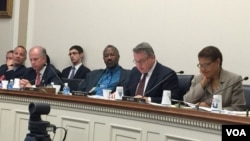A congressional hearing in Washington, on the future of U.S.-Zimbabwe relations, revealed expectations of an ‘harmonious and mutually beneficial,” relationship between the two countries in the, future, however, not with President Robert Mugabe or his ZANU-PF government
The members of Congress, who heard testimonies from Deputy Assistant Secretary of State for Africa, Shannon Smith, Executive Director Ben Freeth of the Mike Campbell Foundation and Regional program director for Africa, Imani Countess of the Solidarity Center, said they hoped to gain insight into the situation in Zimbabwe, to determine U.S. policy there, going forward.
In his opening remarks, the chair of the Subcommittee on Africa, Global Health, Global Human Rights and International Organizations, Christopher Smith, indicated a need to look past President Mugabe, given his age of 91.
“A leader nearing a century or more, presiding over a fractious political scene, in a country that has experienced political and economic turmoil, creates a situation in which planning for possible outcomes to regime change must be devised.”
In looking past Mr. Mugabe, Smith acknowledged a strained and suspicious relationship between the two countries, which he said contributed to the U.S.’s inability to “reach out to and be cooperative with Zimbabwean officials.”
Smith said the strained relations date back to Zimbabwe’s 1980 independence, to which he confessed, the U.S. had little to do with.
“Part of the problem has been resentment by Zimbabwean President Robert Mugabe and his closest advisors, against the United States for not supporting their liberation movement. A backdrop to which was the geopolitical conflict between the Soviet Union and the U.S.”
“Another part of the problem,” Smith said, was Zimbabwe’s intolerance for what he termed “the justifiable public criticism of repressive political policies by the Mugabe government, by successive U.S. administrations.”
Smith however, said the U.S. government stands by its criticisms of Zimbabwe’s government which he said “continues to rule in large part through intimidation and manipulation of elections.” He raised further concern over continued allegations of human rights violations in the form of incarcerations, torture and disappearances of government opponents, and repressive laws among others.
Ranking member Karen Bass of the Subcommittee on Africa, queried the relationship between the U.S. and non-governmental organizations and civil society groups, and their role in supporting transparency and accountability in Zimbabwe, as a counter to Mr. Mugabe’s government, whom she said did not appear to have the people’s needs at heart.
“At the beginning of his tenure, sadly, Mugabe was praised by many as a force for liberating the Zimbabwean people. Obviously, the current government has been marked by challenges and suppression of voices, a restrictive electoral process and lack of transparency in national elections.”
Given the continuing allegations against President Mugabe and his government, Congressman Curt Clawson from Florida, questioned the need for the U.S. to do anything beyond giving direct aid to citizens, as long as President Mugabe is in power.
“Unless we have new leadership at the top, why should we do anything but humanitarian. Am I wrong about that?” the Congressman asked Dr. Smith. Clawson, who summarized Zimbabwe as “an opportunity lost,” continued, saying, that while he was committed to helping the people of Zimbabwe, anything beyond humanitarian, “is pretty hopeless, in terms of using our money and resources” under the circumstances.
Responding to concerns raised by Countess of the Solidarity Center that contined support for Zimbabwe is important for the stability of neighboringer countries, Clawson said it is regional leaders who have defied efforts by the U.S. to put pressure on Mr. Mugabe. A position echoed by Smith.
"Mugabe has enjoyed the support of many other African leaders who have considered him an elder," Smith said, "and have generally declined to join our international efforts to sanction his government."
Several members raised the issue of sanctions, seeking clarity on their makeup and also impact on the government.
But stressing the concern for the Zimbabwean people, Congressman Daniel Donovan from New York implored the Smith to ensure that Zimbabweans now that the U.S. cares, and is still providing assistance.
“When you speak to citizens of Zimbabwe, do they know of our support,” Congressman Donovan queried Smith. “Do they know that the United States supports them?”
Other issues raised at the hearing addressed the impact of sanctions on Zimbabwe, the role of China, Russia and former Ethiopian leader Haile Mariam Mengistu, who lives in Zimbabwe, but was convicted for atrocities in his countries, and sentenced to death in absentia.






